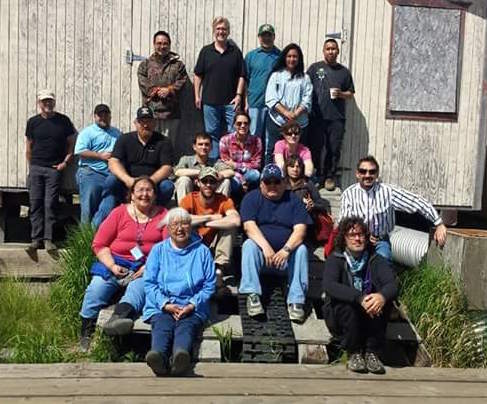Over a decade ago, Oscarville’s community well broke down. Then, this summer, the school well failed too. Residents in the small Kuskokwim village have reverted to using rain and river water. Last week the community landed a major grant to fix that. The funding is part of a larger vision for rural Alaska and could pave the way for additional infrastructure.
In August, the Oscarville school staff showed up at school, ready to begin the semester, and found the building’s well had collapsed.
“Basically this metal pipe, quote unquote, went back to nature.”

That’s James Mikesell, he’s the plant facilities manager for the Lower Kuskokwim School District, or LKSD, and manages the district’s wells.
“We have very ferrous, iron-bearing soil all throughout Alaska, so you put a piece of metal in the ground, and it’s going to rust away.”
To prevent the school from shutting down, Mikesell and his crew mobilized. They emergency shipped a 500-gallon tank and a high-volume pump from Anchorage and loaded it all on the LKSD boat.
“That we lovingly call ‘The Ark.”’
Which they drove to Napaskiak, located across the Kuskokwim, and back to Oscarville.
“And that had to be done on a daily basis. At least one or two trips a day.”
Meanwhile, the school was limiting its water use, and Mikesell and company were rigging an alternative solution.
The village has two wells— the community well and the school well.
The community well collapsed in the early ‘90s, and residents have been using rain and river water ever since. The school well water is restricted to school use. The community and school district have never merged resources to fund and manage one water well, so the community and school have never shared a water source.
That might change. Oscarville recently landed a federal grant of almost a half million dollars to rebuild their water system.
“What this has done is opened the opportunity for the school to share their watering point with the whole community, which has not happened in the past.”
Jackie Schaeffer is a project specialist with design company WH Pacific and is helping facilitate what’s being called “The Oscarville Pilot Project.”
Last year, about a dozen organizations from across the state came together to figure out how to make life better in rural Alaska—which means safer, more comfortable, and less expensive. They want to see how community development can happen as a whole instead of through siloed projects and how that process can empower communities. Ultimately, they want to replicate this system across the state.
The team designated Oscarville, located five miles from Bethel, as their test case.
“The holistic approach is really to change the perspective of how we do community development, and allowing the community to start seeing how these components all tie together.”
Those components include power, housing, transportation, waste and water.
“So it’s everything that binds that community together.”
This recent grant is bigger than just water, because it could help develop additional infrastructure by acting as a match to future grants.
But before any of that can happen, the school needed to fix its water issue.
Mikesell and his team salvaged the old community well and stretched a 400-ft. pipe from that well to the school’s water treatment plant to provide the school and two faculty houses with water for the winter.
The solution is temporary. The well could breakdown and the line could freeze.
“We’ve done everything we can think to do to insulate that line from cold temperatures. But there’s no guarantees with Mother Nature how cold it’s going to get.”
If the well fails this winter, then it’s back to hauling water from Napaskiak.
The school district and community have from now until spring thaw to figure out how to merge water systems. Meanwhile, the pilot project crew will be working in Oscarville this winter, increasing energy efficiency in the town’s 20 buildings, changing electric meters to deliver lower cost electricity, and hoping the school’s water pipe doesn’t freeze.
Anna Rose MacArthur is a reporter at KYUK in Bethel.




